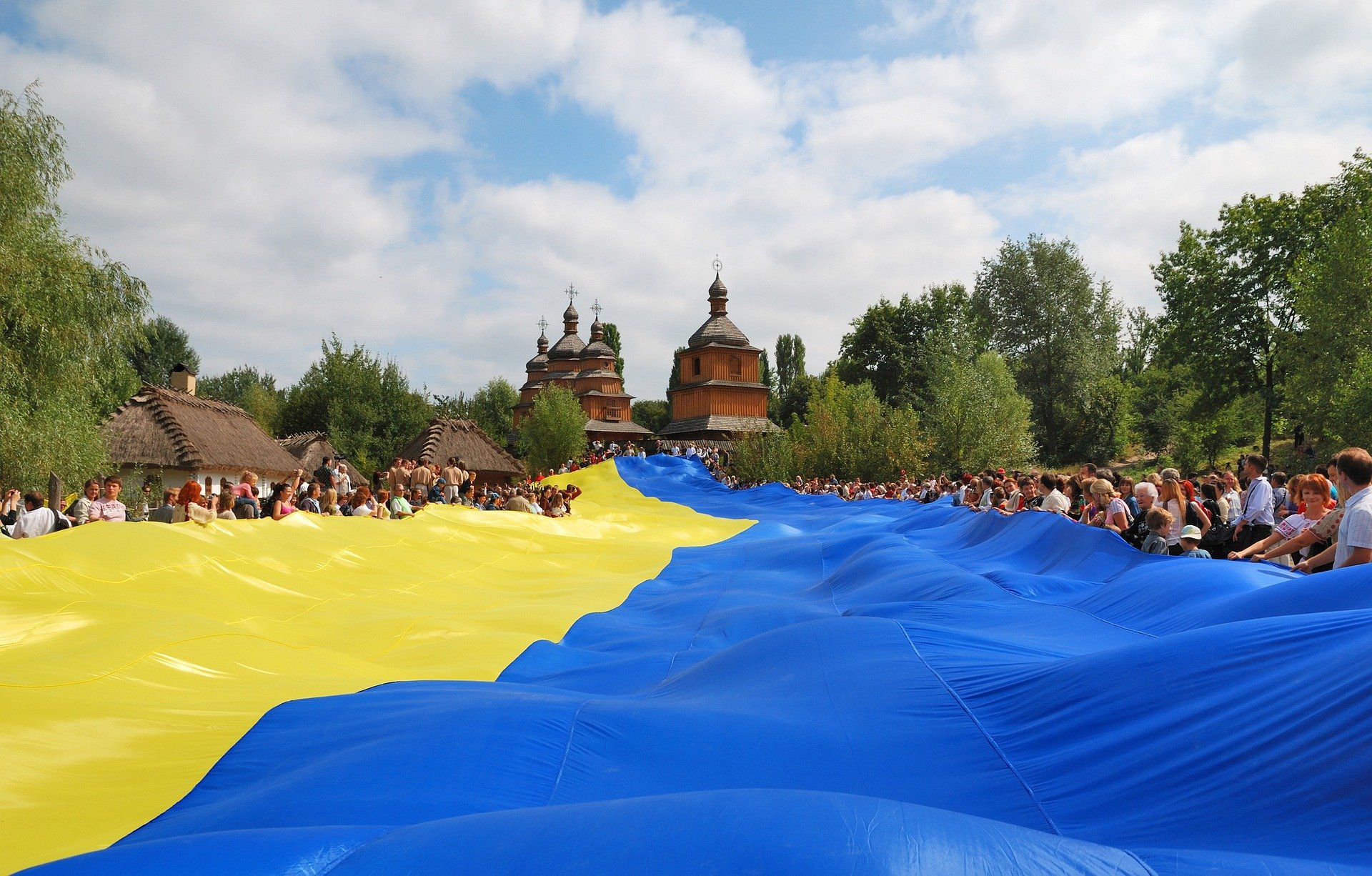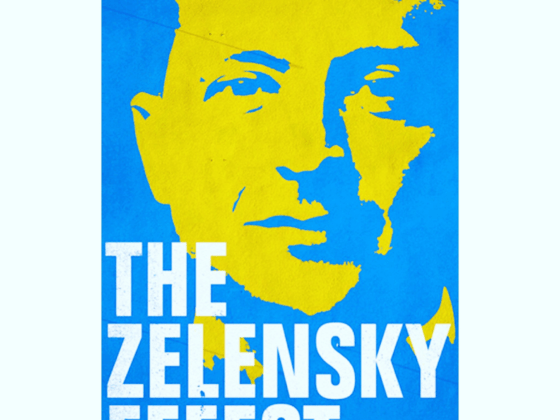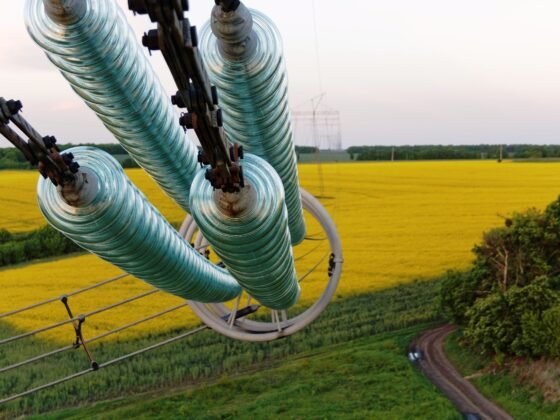One of the declared goals of Russia’s full-blown invasion of Ukraine in February 2022 was “denazification,” a bizarre term revealing a strong desire to crush all manifestations of Ukrainian nationalism, which Russian propaganda equated with Nazism. In fact, Ukrainians’ attitude toward nationalism remained ambivalent prior to the invasion as they had not fully overcome the negative meaning of the term during Soviet times, even if they began to gradually associate “nationalism” with “national liberation.” To be sure, the 2014 Russian intervention in Crimea and the Donbas led many people in Ukraine to reconsider their perception of nationalism in general and Ukrainian nationalism in particular. At the same time, the attitude toward the best-known nationalist organizations of the past, the underground Organization of Ukrainian Nationalists (OUN) and its guerilla arm, the Ukrainian Insurgent Army (UPA), which had fought the Polish, Nazi, and Soviet regimes from the 1930s to the early 1950s, was mixed, albeit gradually growing more positive.
Russia’s massive aggression in 2022 has changed Ukrainians’ attitudes toward the Russian state and its people and their perception of the Ukrainian nation and nationalism. Contrary to Putin’s expectations, most Ukrainians began to fully support armed resistance to the invaders, but they also relate it to the supposedly similar resistance in the past, which, accordingly, they view in a more positive light. Kindled by recent surveys and analyses on this topic, our commissioned study shows that citizens have indeed become less negative toward nationalism, narrowing their perceptual difference between good patriotism and bad nationalism, driving a new civic meaning of being Ukrainian.
Context and Method
A survey in September 2022 by the Kyiv International Institute of Sociology (KIIS) demonstrated a rather positive attitude toward the OUN-UPA, with 43 percent of respondents viewing their “activities during the Second World War” positively and only 8 percent negatively (the rest were ambiguous or undecided), a drastic change from a KIIS survey of 2013 where the negative attitude clearly prevailed, 42 percent vs. 22 percent.
Moreover, in an August 2022 survey by the Ilko Kucheriv Democratic Initiatives Foundation, fully 67 percent of respondents agreed with the statement “We need a healthy nationalism,” although this figure is not representative of the entire Ukrainian population as the survey did not include the occupied and combat-affected parts of the country. A positive view of past and present Ukrainian nationalism was prevalent even in the eastern and southern oblasts (except for the Donbas and Crimea, where the surveys could not be conducted), which had traditionally been the friendliest to Russia and the weariest of Ukrainian nationalism.
To add nuance, thanks to funding from PONARS Eurasia, I commissioned six focus group discussions in various parts of Ukraine from KIIS. Two focus groups involved residents of Kyiv, one for people who stayed in the city through the months of the full-blown invasion (K1) and the other for those who left in late February or early March but returned after the Russian troops were pushed far from Kyiv in early April (K2). Two other groups consisted of people from Kharkiv, Ukraine’s second-largest city, which was still heavily shelled by the Russians at the time of discussions, so it was unreasonable for refugees to return. One group involved those who remained in the city (Kh1), and the other those who had fled to other parts of Ukraine or abroad (Kh2). Two final groups consisted of residents of the western city of Chernivtsi (Ch1) and those people from the more endangered regions of the country who had taken refuge there (Ch2).
With a few exceptions, all participants were between 25 and 40 years of age, with roughly even distribution by gender. All six groups met on August 11-13, that is, prior to significant Ukrainian offensives in the east and south, which not only pushed the Russian troops from the vicinity of Kharkiv but also greatly boosted Ukrainians’ confidence and pride in their army and country. Nevertheless, they were already quite confident and proud, which was vividly demonstrated by mass surveys and confirmed in the group discussions.
Salient Ukrainian identity
The first result worth noting is the high salience of Ukrainian identity. Most respondents either explicitly stated that “Ukrainian” for them is synonymous with “citizen of Ukraine” or implied that they primarily meant civic attachment rather than ethnic origin. Moreover, when specifically asked which identity is more important to them, Ukrainian or citizen of Ukraine, most people indicated the former, arguing that while citizenship denotes a legal status and a corresponding set of obligations, national identity involves a psychological attachment that would not go away if they moved to permanently live in another country (some referred to their present experience abroad).
It is only among Kharkivites who stayed in the city that several people indicated a lower salience of Ukrainian identity compared to the local one, and one participant manifested her preference for East Slavic identity by arguing that the division of the Russian, Ukrainian, and Belarusian peoples with “common roots” was “artificial” (Kh1, female, 40 years, in Russian). Even in that group, this seemed to be an exceptional stance; indeed, several other participants passionately stated that Russia’s full-blown invasion shattered their earlier perception of Russians as a brotherly people.
Equally revealing are the answers to the question of what it means to be Ukrainian. Along with the ethnocultural meaning of Ukrainian identity as knowledge of history, respect for traditions, and the use of the national language, many participants referred to elements of civic attachment and engagement, including work for the good of Ukraine, dutiful payment of taxes, donations to the army and, above all, love of country. Several people mentioned love of freedom or, indeed, freeness; in the words of one Kharkivite, “to me, being Ukrainian is first and foremost being free, freedom” (Kh1, female, 48 years, in Russian). It is the love of freedom and readiness to unite in the fight for it that was most often mentioned among examples Ukrainians can give to other nations. As one participant in the Chernivtsi IDP group put it: “Freedom: the Revolution of Dignity, for example. Freedom: the defense of one’s fatherland when the mightier enemy attacks us. And it was like nobody believed in us or gave us any chance [to withstand]. And reason tells one to surrender, to submit, but no. Freedom above all” (Ch2, male, 50 years, in Ukrainian).
Moreover, the successful resistance to the mighty aggressor led many Ukrainians who had traditionally been rather critical of their country to perceive it as successful in many other respects as well, as demonstrated by several participants’ references to the abundance of talented individuals and the effective functioning of certain domains such as agriculture or health care. However, most participants were not ready to call Ukraine a successful country in view of its obvious problems; hence they either referred to external obstacles that prevent Ukrainians from realizing their potential or contrasted the effective citizenry with deficient authorities.
Patriotism and Nationalism as Largely Synonymous
The focus groups also demonstrated that while participants in all groups were much more willing to call themselves patriots than nationalists, many perceived the two terms as largely synonymous, their meaning being rather similar to the civic understanding of Ukrainianness. The most widespread interpretation of patriotism emphasized attachment to one’s country and dedicated work for its good in times of war, understood primarily as fighting on the frontline or helping those on the frontline. While some residents of Chernivtsi and Kyiv justified their self-classification as patriots by the fact that they had not left the country in time of danger or had returned as soon as their city became reasonably safe, others, notably among those staying in Kharkiv, rejected this characteristic because their current behavior was guided by concern about their family rather than their country.
Few people raised their hand when asked whether they could call themselves nationalists; in some groups, none at all. Explaining why not, people from different parts of Ukraine revealed the still widespread belief that “a nationalist is someone who recognizes only one’s own nation and hates others” (Kh1, male, 40 years, in Russian). Some even argued that nationalism is particularly unsuitable for a country such as Ukraine: “I rather cannot call myself a nationalist because we have a multinational country [and nationalism posits that] nobody has the right to live in Ukraine but Ukrainians” (Ch1, male, 35 years, in Ukrainian).
However, in almost all groups, such statements were rebutted by people arguing the equation of nationalism and Nazism is a product of Soviet and Russian propaganda. As one Kyiv resident put it: “It is just that a lot of propaganda went through us, through the minds of all of us, hence we have an impression that nationalism is something bad, plain awful. And natsyky [a popular term for (radical) Ukrainian nationalists based on the word Nazi] is the worst that the country has experienced. But in my mind, they are just ardent patriots. For me… Russian propaganda made the words Nazism and nationalism into one, made into natsyky. Therefore, everybody thinks that Nazism and nationalism are the same” (K2, male, 25 years, in Ukrainian). Another Kyivite argued: “Nationalism is what makes a group into a people [narod], in my view. It is just that it [the term] is used by politicians somewhat distortedly. Plus, [there are] the Soviet stereotypes that if it is a Ukrainian nationalist, then it is very bad. If a Jew is a nationalist in Israel, it is good. If it is in America, it is normal. In Russia, normal. And Ukrainians are some very scary people. And therefore, we retain it on a genetic level” (K1, male, 38 years, in Ukrainian).
Some participants spoke at length about why nationalism is something Ukraine needs and how nationalists do a lot of good for the country. In the words of a Chernivtsi resident: “Not all in Ukraine can be nationalists, but one needs to promote the idea of Ukraine, and it is this small percent of nationalists that will present the idea. That is, for them, it is more important than for an ordinary person; hence they will, so to speak, be on the frontline in the fight for Ukraine, for the notion of Ukraine. And if there are no such frontrunner nationalists, then, in principle, the nation is likely to lose its identification little by little, little by little” (Ch1, male, 40 years, in Russian).
His words resonate with that of a Kyivite who emphasized that the nationalists have already accomplished a lot in this fight, both by fighting the present enemy and keeping alive the memory of the past fighters: “These people, even taking the example of 2014, these were the first people who began to defend Ukraine [in the Donbas]. And now that the [large-scale] war started, they were the first people to be on the frontline. Yes, they have a kind of fanatical attitude toward Ukraine, its history, and its language. But these people, they… well, these are people who are ready to give their lives for Ukraine. There are politicians who exploit the term [nationalism], and there are people who are [nationalists] in their hearts. And this is very well. Because this is not only history which they cherish and pass on. We have learned a lot from them after 2014 about the OUN, the UPA, and some Ukrainian figures who earlier… who were presented in a distorted way” (K2, male, 35 years, in Ukrainian).
The attitude toward nationalism was more critical among Kharkivites, probably because of the “anti-nationalist” discourse of those parties that dominated local politics in the post-Soviet decades. At the same time, some participants in both Kharkiv groups managed to reflect on the impact of the Soviet past and think beyond it: “Western Ukraine was brought up in the spirit of nationalism for a very long time. And the Soviet territory, the opposite. The Soviet person [was taught] that people are brothers, stuff like that. Therefore, for me, nationalism is something alien. But people who adhere to it and do it reasonably, I don’t see anything bad in this” (Kh1, male, 40 years, in Russian). One Kharkiv man went as far as to explicitly equate the three terms proposed for discussion and thus to present nationalism in a positive light: “You ask [what is] nationalism, patriotism, Ukrainian. This is all the same. That is, I do not even distinguish these notions. … Well, this is simply our love of our nation. You feel this identity with being Ukrainian” (Kh2, male, 43 years, in Russian).
Several other participants positively evaluated the Ukrainian nationalists of the World War II period, despite the realization that their activities were targeting, among other entities, the Soviet regime in Ukraine. When asked by the moderator with whom “the Banderites” fought, an IDP from Kharkiv clearly stated that “they fought for their Ukraine, for their land. … In part with the fascists, and in part with the Soviet regime” (Kh2, male, 39 years, in Russian). “Banderites” is a term that was widely used in Soviet and post-Soviet times in reference to members of the OUN and UPA, thus relating them to the figure of a OUN leader Stepan Bandera. Another participant in the same group, in response to the question on how he understood the term “Banderites,” ridiculed the Russian propaganda applying it to all Ukrainian nationalists or even all Ukrainians: “These are Muscovites’ cockroaches. Such small [bugs] crawl in their brain.” He thus not only rejected the Russian claims to protect Ukraine’s Russian speakers from allegedly dangerous “Banderites” but also delegitimized the negative attitude toward Ukrainian nationalism, past, and present.
Conclusion
These discussions demonstrate that contrary to the Russian leadership’s expectations, the full-blown invasion of Ukraine boosted its citizens’ national identity and led many of them to reconsider their negative attitude toward nationalism. While some still contrast good patriotism and bad nationalism, others have come to view the two terms as synonymous and close to the civic meaning of being Ukrainian. Regional differences persist, with easterners being more cautious about nationalism than residents of the West and center, but change affects all parts of Ukraine, which is drifting away from Russia. It is clear that Russian aggression and atrocities have urged Ukrainians to define their national identity in anti-Russian terms, which will more strongly drive Ukraine toward Europe and the West, preventing any near-term reconciliation between the Ukrainian and Russian peoples.
Volodymyr Kulyk is Head Research Fellow at the Institute of Political and Ethnic Studies at the National Academy of Sciences of Ukraine. He is also Professor at the Ukrainian Free University and Associate at the Ukrainian Research Institute at Harvard University. Note: This memo was written within the framework of the author’s research project on national identity and anti-Russian sentiment in war-time Ukraine, which is supported by a non-resident fellowship from Hanse-Wissenschaftskolleg, Delmenhorst, Germany.











